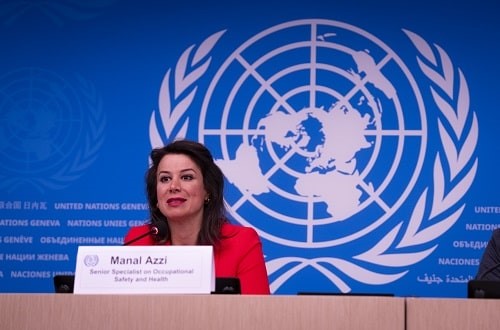More than 70 per cent of the global workforce could be exposed to serious health hazards because of climate change, and existing occupational health and safety legislation may not be sufficient to protect workers, according to a new report by the International Labour Organization (ILO).
News
Climate change could expose 70 per cent of workers to health risks, warns UN
Exposure to excessive heat will affect more than 2.4 billion of the world’s 3.4 billion-strong workforce at some point, the UN body has estimated in a report entitled Ensuring Safety and Health at Work in a Changing Climate, which was published on 22 April to coincide with Earth Day. This equates to just over 70 per cent of the global workforce and marks a rise from 65.5 per cent since 2000.
 ILO's Manal Azzi: "It's clear that climate change is already creating significant additional health hazards for workers." Photograph: ILO/Rafael Duarte
ILO's Manal Azzi: "It's clear that climate change is already creating significant additional health hazards for workers." Photograph: ILO/Rafael Duarte
The report estimated that 18,970 lives and 2.09 million disability-adjusted life years are lost each year as a result of more than 22 million workplace injuries that are attributable to excessive heat.
In addition to the effects on the human body of excessive heat, climate change is creating a “cocktail of hazards” that can result in health conditions including cancer, cardiovascular disease, respiratory illnesses, kidney dysfunction and mental health issues, said the ILO in its report.
“It’s clear that climate change is already creating significant additional health hazards for workers,” said ILO team lead for occupational safety and health, Manal Azzi. “Occupational safety and health considerations must become part of our climate change responses – both policies and actions.”
Existing health and safety legislation may need to be revised to keep pace with the effects on workers of climate change, the report concluded.
“As climate change hazards evolve and intensify, it may be necessary to re-evaluate existing legislation or create new regulations and guidance, to ensure that workers are properly protected,” said the report, adding that occupational safety and health considerations “should be mainstreamed into climate-related policies, and climate concerns should be integrated into occupational safety and health practice”.
The ILO report has identified six key impacts of climate change on occupational safety and health: excessive heat; ultraviolet (UV) radiation; extreme weather events; workplace air pollution; vector-borne diseases; and changes in agrochemical use.
Those most at risk of the effects of excessive heat include agriculture workers and people who work in construction. Primary health impacts, according to the report, include heatstroke, cardiovascular disease and chronic kidney disease. Construction and agriculture workers are also most at risk from UV radiation, with skin cancer and macular degeneration among the resulting health conditions.
Air pollution causes 860,000 work-related deaths a year, said the report, while more than 15,000 work-related deaths a year are attributable to parasitic and vector diseases. Meanwhile, increased use of pesticides is putting agriculture workers at greater risk of poisoning, cancer and immune suppression.
NEWS

Mates in Mind warns HSE “stepping up” focus on stress following university breach
By Belinda Liversedge on 05 March 2026
Mental health charity, Mates in Mind is urging businesses to review their stress management practices following regulatory action from HSE and in the build up to Stress Awareness month in April.

Manufacturers call for full implementation of Mayfield Review to tackle UK sickness crisis
By Belinda Liversedge on 26 February 2026
Trends in wellbeing and long-term ill health are “worsening with the size of the problem growing, not shrinking,” the UK’s manufacturing association Make UK has warned.

Employers unprepared for menopause duties, research suggests
By Belinda Liversedge on 24 February 2026
Most employers remain uncertain about duties coming into force to support female workers undergoing the menopause, a new poll suggests.



